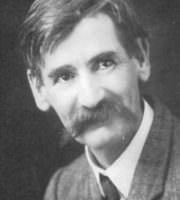by Henry Lawson
It was somewhere in September, and the sun was going down,
When I came, in search of `copy', to a Darling-River town;
`Come-and-have-a-drink' we'll call it -- 'tis a fitting name, I think --
And 'twas raining, for a wonder, up at Come-and-have-a-drink.
'Neath the public-house verandah I was resting on a bunk
When a stranger rose before me, and he said that he was drunk;
He apologised for speaking; there was no offence, he swore;
But he somehow seemed to fancy that he'd seen my face before.
`No erfence,' he said. I told him that he needn't mention it,
For I might have met him somewhere; I had travelled round a bit,
And I knew a lot of fellows in the bush and in the streets --
But a fellow can't remember all the fellows that he meets.
Very old and thin and dirty were the garments that he wore,
Just a shirt and pair of trousers, and a boot, and nothing more;
He was wringing-wet, and really in a sad and sinful plight,
And his hat was in his left hand, and a bottle in his right.
His brow was broad and roomy, but its lines were somewhat harsh,
And a sensual mouth was hidden by a drooping, fair moustache;
(His hairy chest was open to what poets call the `wined',
And I would have bet a thousand that his pants were gone behind).
He agreed: `Yer can't remember all the chaps yer chance to meet,'
And he said his name was Sweeney -- people lived in Sussex-street.
He was campin' in a stable, but he swore that he was right,
`Only for the blanky horses walkin' over him all night.'
He'd apparently been fighting, for his face was black-and-blue,
And he looked as though the horses had been treading on him, too;
But an honest, genial twinkle in the eye that wasn't hurt
Seemed to hint of something better, spite of drink and rags and dirt.
It appeared that he mistook me for a long-lost mate of his --
One of whom I was the image, both in figure and in phiz --
(He'd have had a letter from him if the chap were living still,
For they'd carried swags together from the Gulf to Broken Hill.)
Sweeney yarned awhile and hinted that his folks were doing well,
And he told me that his father kept the Southern Cross Hotel;
And I wondered if his absence was regarded as a loss
When he left the elder Sweeney -- landlord of the Southern Cross.
He was born in Parramatta, and he said, with humour grim,
That he'd like to see the city ere the liquor finished him,
But he couldn't raise the money. He was damned if he could think
What the Government was doing. Here he offered me a drink.
I declined -- 'TWAS self-denial -- and I lectured him on booze,
Using all the hackneyed arguments that preachers mostly use;
Things I'd heard in temperance lectures (I was young and rather green),
And I ended by referring to the man he might have been.
Then a wise expression struggled with the bruises on his face,
Though his argument had scarcely any bearing on the case:
`What's the good o' keepin' sober? Fellers rise and fellers fall;
What I might have been and wasn't doesn't trouble me at all.'
But he couldn't stay to argue, for his beer was nearly gone.
He was glad, he said, to meet me, and he'd see me later on;
He guessed he'd have to go and get his bottle filled again,
And he gave a lurch and vanished in the darkness and the rain.
. . . . .
And of afternoons in cities, when the rain is on the land,
Visions come to me of Sweeney with his bottle in his hand,
With the stormy night behind him, and the pub verandah-post --
And I wonder why he haunts me more than any other ghost.
Still I see the shearers drinking at the township in the scrub,
And the army praying nightly at the door of every pub,
And the girls who flirt and giggle with the bushmen from the west --
But the memory of Sweeney overshadows all the rest.
Well, perhaps, it isn't funny; there were links between us two --
He had memories of cities, he had been a jackeroo;
And, perhaps, his face forewarned me of a face that I might see
From a bitter cup reflected in the wretched days to be.
. . . . .
I suppose he's tramping somewhere where the bushmen carry swags,
Cadging round the wretched stations with his empty tucker-bags;
And I fancy that of evenings, when the track is growing dim,
What he `might have been and wasn't' comes along and troubles him.
Last updated May 02, 2015





